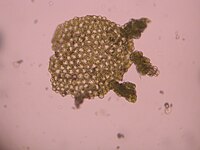
Photo from wikipedia
Abstract This paper investigates patterns of social reproduction of science education outcomes for high school students in Israel, specifically by examining the relationship between one aspect of science capital –… Click to show full abstract
Abstract This paper investigates patterns of social reproduction of science education outcomes for high school students in Israel, specifically by examining the relationship between one aspect of science capital – as measured by having a scientist in the family – and SES with three measures of science education success: interest in science; science self-efficacy; and aspirations to pursue science at university. Regression analyses of questionnaire data (N = 380) from 14- to 18-year-old high school students yield differences between Jewish (majority) and Arab-Palestinian (minority) students. Specifically, regarding aspirations for university science, having a scientist in the family and higher SES are positively associated with better outcomes for Jewish students only. The analyses highlight the potential advantages of employing theories of social reproduction and science capital to explore inequalities in science education, which in this case is used to identify additional challenges in increasing minority student uptake in postsecondary science.
Journal Title: British Journal of Sociology of Education
Year Published: 2020
Link to full text (if available)
Share on Social Media: Sign Up to like & get
recommendations!